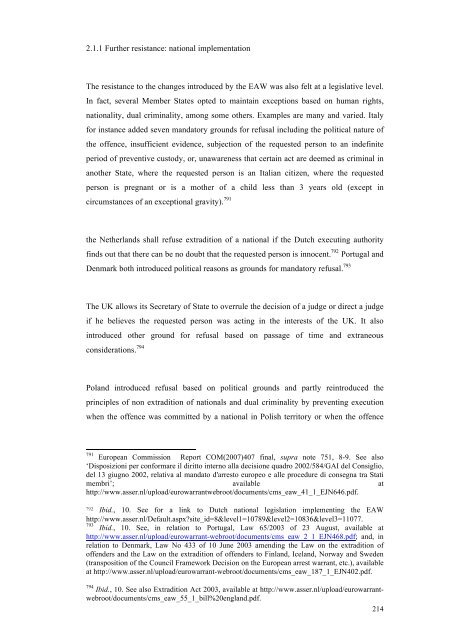The evolution of European Union criminal law (1957-2012)
The evolution of European Union criminal law (1957-2012)
The evolution of European Union criminal law (1957-2012)
Create successful ePaper yourself
Turn your PDF publications into a flip-book with our unique Google optimized e-Paper software.
2.1.1 Further resistance: national implementation<br />
<strong>The</strong> resistance to the changes introduced by the EAW was also felt at a legislative level.<br />
In fact, several Member States opted to maintain exceptions based on human rights,<br />
nationality, dual <strong>criminal</strong>ity, among some others. Examples are many and varied. Italy<br />
for instance added seven mandatory grounds for refusal including the political nature <strong>of</strong><br />
the <strong>of</strong>fence, insufficient evidence, subjection <strong>of</strong> the requested person to an indefinite<br />
period <strong>of</strong> preventive custody, or, unawareness that certain act are deemed as <strong>criminal</strong> in<br />
another State, where the requested person is an Italian citizen, where the requested<br />
person is pregnant or is a mother <strong>of</strong> a child less than 3 years old (except in<br />
circumstances <strong>of</strong> an exceptional gravity). 791<br />
the Netherlands shall refuse extradition <strong>of</strong> a national if the Dutch executing authority<br />
finds out that there can be no doubt that the requested person is innocent. 792 Portugal and<br />
Denmark both introduced political reasons as grounds for mandatory refusal. 793<br />
<strong>The</strong> UK allows its Secretary <strong>of</strong> State to overrule the decision <strong>of</strong> a judge or direct a judge<br />
if he believes the requested person was acting in the interests <strong>of</strong> the UK. It also<br />
introduced other ground for refusal based on passage <strong>of</strong> time and extraneous<br />
considerations. 794<br />
Poland introduced refusal based on political grounds and partly reintroduced the<br />
principles <strong>of</strong> non extradition <strong>of</strong> nationals and dual <strong>criminal</strong>ity by preventing execution<br />
when the <strong>of</strong>fence was committed by a national in Polish territory or when the <strong>of</strong>fence<br />
791 <strong>European</strong> Commission Report COM(2007)407 final, supra note 751, 8-9. See also<br />
‘Disposizioni per conformare il diritto interno alla decisione quadro 2002/584/GAI del Consiglio,<br />
del 13 giugno 2002, relativa al mandato d'arresto europeo e alle procedure di consegna tra Stati<br />
membri’; available at<br />
http://www.asser.nl/upload/eurowarrantwebroot/documents/cms_eaw_41_1_EJN646.pdf.<br />
792 Ibid., 10. See for a link to Dutch national legislation implementing the EAW<br />
http://www.asser.nl/Default.aspxsite_id=8&level1=10789&level2=10836&level3=11077.<br />
793<br />
Ibid., 10. See, in relation to Portugal, Law 65/2003 <strong>of</strong> 23 August, available at<br />
http://www.asser.nl/upload/eurowarrant-webroot/documents/cms_eaw_2_1_EJN468.pdf; and, in<br />
relation to Denmark, Law No 433 <strong>of</strong> 10 June 2003 amending the Law on the extradition <strong>of</strong><br />
<strong>of</strong>fenders and the Law on the extradition <strong>of</strong> <strong>of</strong>fenders to Finland, Iceland, Norway and Sweden<br />
(transposition <strong>of</strong> the Council Framework Decision on the <strong>European</strong> arrest warrant, etc.), available<br />
at http://www.asser.nl/upload/eurowarrant-webroot/documents/cms_eaw_187_1_EJN402.pdf.<br />
794 Ibid., 10. See also Extradition Act 2003, available at http://www.asser.nl/upload/eurowarrantwebroot/documents/cms_eaw_55_1_bill%20england.pdf.<br />
214
















